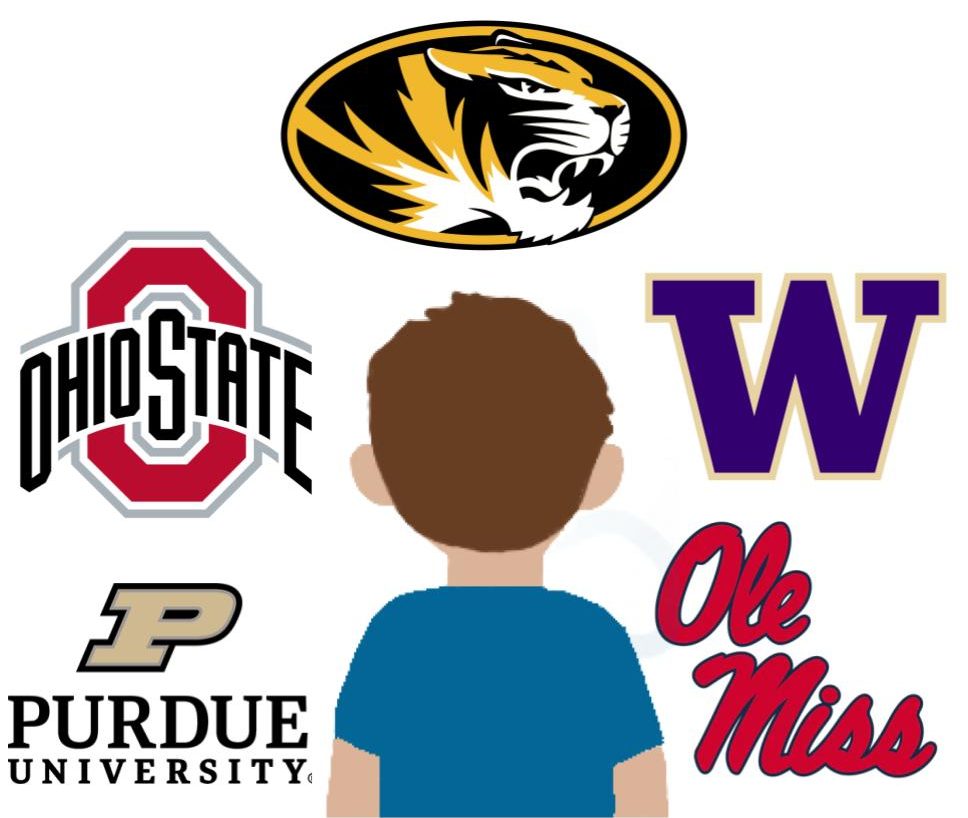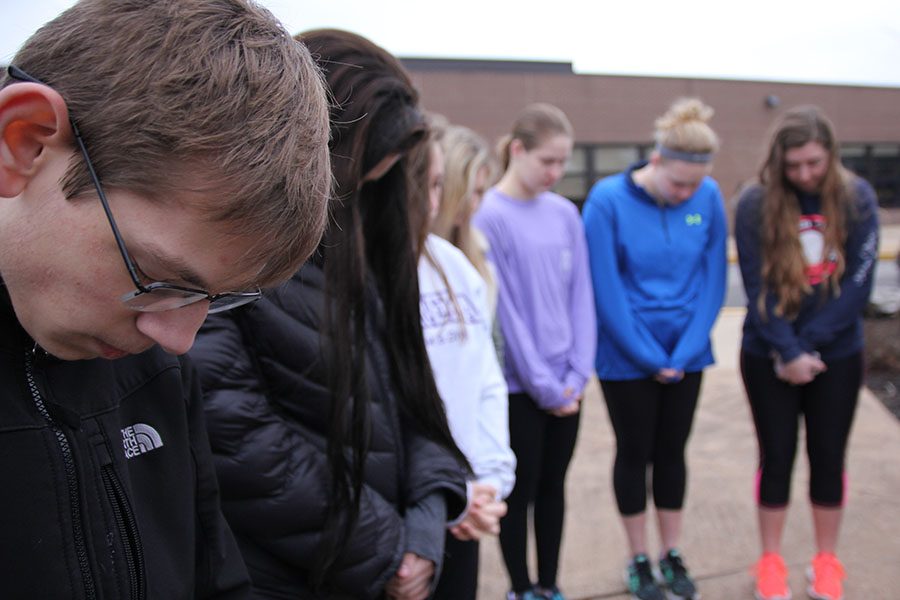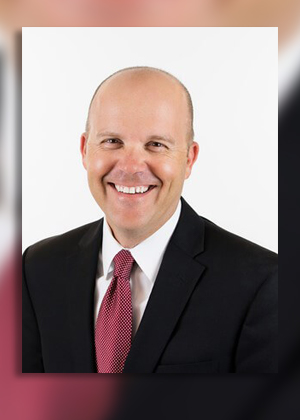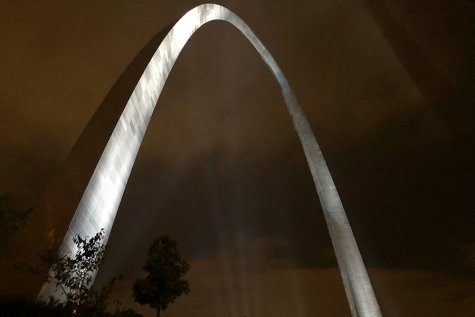Know/inform/care
Joe Kruessel (11) prays at the flagpole with members of FCA at their Ash Wednesday service, March 1. Students, teachers and faculty members came out to celebrate the start of the Lent season leading up to the Easter holiday.
Local
Know: A Missouri Supreme Court ruling on Tuesday, Feb. 28, affirmed the right for St. Louis City to slowly increase their minimum wage to $11 an hour by 2018.
Inform: In 2015, Missouri lawmakers passed a bill prohibiting local bans on plastic bags. A provision on that bill also stated that local governments could no longer increase municipal minimum wages; however, the provision would not preempt local laws passed by Aug. 28, 2015.
That is the same day the St. Louis minimum wage ordinance took effect.
Residents of St. Louis City are split over the decision. While minimum wage workers are overjoyed at the idea of more capital to use for housing, education and entertainment, business owners claim this increased expense only hinders Missouri commerce.
The St. Louis Post Dispatch reported Brad Jones, Missouri director of the National Federation of Independent Business, saying, “If you allow one city or county to mandate higher wages, you’re putting businesses there at a real competitive disadvantage when compared with businesses in nearby communities where the cost of doing business — and the cost of goods and services — is that much lower.”
Care: When wages increase, economics dictate that businesses will either have to cut costs or raise prices. With the minimum wage in the city significantly higher than that of the surrounding area, it’s possible that local businesses may consider moving to the county in order to save money. This would serve as a huge benefit for our schools specifically. Commercial industry in the area is taxed at a much higher rate than private homes meaning that more local businesses could lead to more money for education.
High schoolers working minimum wage part-time jobs may also want to take note of this law as it could lead to an increased minimum wage statewide. Missouri currently holds firm at $7.70 an hour which is $.45 higher than the nation-wide minimum. Within the next few years, that number could rise to $10, $11, or even potentially $15 as some are requesting.
National
Know: The 89th Academy Awards ceremony took place last Sunday, Feb. 26, at the Dolby Theatre in Los Angeles, California.
Inform: The biggest winners of the night were “Moonlight,” which took home three Oscars in categories like Best Picture and Best Supporting Actor, and “La La Land,” which took home five Oscars in categories like Best Actress, Best Director and Best Cinematography.
At the end of the night, when Warren Beatty and Faye Dunaway got up to present the winner for Best Picture, there was a lot of confusion. Beatty opened up the envelope and began to look around for clarification. Apparently, the letter he opened up was the one for Best Actress. On it read Emma Stone’s name for “La La Land.” Beatty showed the paper to Dunaway who mistakenly announced them as the winner.
After “La La Land” producers gave three individual speeches they realized they had not actually won. They proclaimed “Moonlight” as the true winner, holding up the right card for all to see. As the cast and crew of “Moonlight” took the stage, “La La Land” handed off their Oscar statues and departed from the stage.
Care: Taking place in Miami, “Moonlight” centers around the story of Chiron, a young, gay black man. The film’s synopsis reads, “A three-part narrative spanning the childhood, adolescence, and adulthood of an African-American man who survives Miami’s drug-plagued inner city, finding love in unexpected places and the possibility of change within himself.”
The struggle of the main character is one that young men and women across America know all too well. Approximately 3.8% of Americans identify as gay, lesbian, bisexual or transgender, according to the Williams Institute at the UCLA School of Law. There are about 1,840 students at EHS; that means potentially 70 of them are members of the LGBTQ+ community. Seeing minority characters like themselves go through similar struggles on the big screen is not only satisfying but helps shed light on growing issues in the U.S. facing these minorities.
International
Know: Freedom House, an independent watchdog organization funded by the U.S. government, released new findings on the methods and extent to which religious persecution is occurring in China, Feb. 28.
Inform: The Chinese Communist Party only recognizes five different types of faith–Chinese Buddhism, Islam, Catholicism, Protestantism and Taoism–and each of these are closely regulated by the government. Despite the Chinese government’s efforts to monitor all religious activity, millions of people still practice their faith in hiding, in secret and in fear.
Freedom House states that, “At least 100 million people—nearly one-third of estimated believers in China—belong to religious groups facing “high” or “very high” levels of persecution (Protestant Christians, Tibetan Buddhists, Uighur Muslims, and Falun Gong).”
There are approximately 72-92 million Christians in China, and the majority of these are unregistered with the government, according to Freedom House. Their persecution has gone beyond discrimination and into a significant human rights violation.
Despite widespread resistance, the scale of oppression has only escalated since President Xi Jinping rose to power in late 2012. Freedom House says protestants have been “particularly affected by cross-removal and church-demolition campaigns, punishment of state-sanctioned leaders, and the arrest of human rights lawyers who take up Christians’ cases.”
Care: Religious freedom around the world has been under attack. Outside of China, Muslims are continually stereotyped and harassed for being associated with radical Islamic terrorism.
Historically, America has been a country known for its inclusiveness of a variety of religious denominations. This is in stark contrast to President Donald Trump’s recent travel ban on middle-eastern countries that has been labeled a “Muslim Ban” by members of the media and the public.
At EHS, students represent all sorts of religious organizations from Judaism and Christianity to Islam and Atheism. Individual clubs like FCA and S.W.A.T. practice their faith on campus every week by partaking in meetings, prayer and song.
Ash Wednesday, the official start of the Christian Lent season, and FCA participated in the celebration by hosting an Ash Wednesday service by the flagpole, March 1 . This event included the distribution of ashes, of communion and readings from the Bible.
One of the qualities that make public education so effective lies in its ability to bring groups of students with different backgrounds together under one roof.
Your donation will support the student journalists of Eureka High School - MO. Your contribution will allow us to purchase equipment and cover our annual website hosting costs.

This is Nick’s third semester on the EHS hub staff. He is the Digital Media Editor-in-chief. You can follow him on twitter @nweaverEHS_hub.
He enjoys...

This is Peterson's seventh semester on staff where she serves as the Managing Editor for both the Eurekana Yearbook and EHS-hub. Peterson enjoys sleeping,...




















